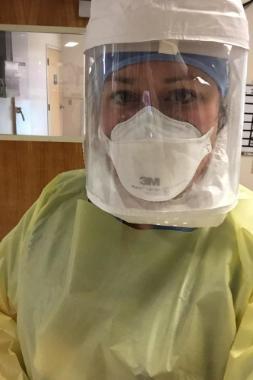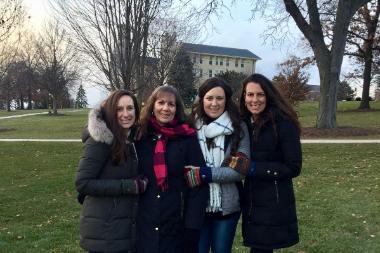May 26, 2020
Wheaton College alumna Jessica Anderson '11 shares her experience of working as an ICU nurse during the COVID-19 pandemic.
 Jessica Anderson '11 found her calling as an intensive care unit (ICU) nurse. Every day, Anderson drives to work to care for ICU patients at a hospital in Southern California. Two months ago, her life turned upside down due to the arrival of coronavirus in the United States. Now, instead of a day consisting of charting and answering call lights and questions from staff, she scrubs into an N95 mask, gown, and paper suit to ensure she’s protected from COVID-19 before going to battle on the front lines.
Jessica Anderson '11 found her calling as an intensive care unit (ICU) nurse. Every day, Anderson drives to work to care for ICU patients at a hospital in Southern California. Two months ago, her life turned upside down due to the arrival of coronavirus in the United States. Now, instead of a day consisting of charting and answering call lights and questions from staff, she scrubs into an N95 mask, gown, and paper suit to ensure she’s protected from COVID-19 before going to battle on the front lines.
"Working with COVID patients is scary because there are so many unknown risks," Anderson said.
But the first time Anderson looked into the room of a COVID-19 patient, she knew God had prepared her for such a time as this.
"I had to get through some mind tricks as I approached my first COVID room, but I reminded myself that God had me there for a reason and that helped me step through the doorway," she said. "His peace and strength have sustained me through this time."
 Anderson graduated from Wheaton 10 years ago with an Applied Health Science degree. As a third-generation Wheatie, she followed her grandparents (Ramona Schacht Schroeder '52 and Eldon Schroeder '50) and her mother (Sharon Schroeder Anderson '80) to Wheaton along with her two sisters: Melissa '10 and Brittany '14.
Anderson graduated from Wheaton 10 years ago with an Applied Health Science degree. As a third-generation Wheatie, she followed her grandparents (Ramona Schacht Schroeder '52 and Eldon Schroeder '50) and her mother (Sharon Schroeder Anderson '80) to Wheaton along with her two sisters: Melissa '10 and Brittany '14.
Today, Anderson has four roles: Floor nurse, clinical manager for the ICU, interim nurse educator for the ICU and Definitive Observation Unit (DOU), and interim co-director of the ICU—all during a global pandemic.
On a typical day, Anderson creates the schedule for ICU nurses, produces educational resources, conducts trainings for staff, and attends hospital-wide administrative meetings as a voice for the ICU and DOU. As a nurse educator, Anderson leads "improvement projects" for the ICU and audits the unit as to how they can best improve and stay compliant with hospital and state policies.
The outbreak of COVID-19 changed Anderson's priorities dramatically. Patient care is still her main focus, but the ICU initially had a limited number of negative pressure rooms prepared for COVID patients. In a matter of days, Anderson helped prepare all of the ICU rooms to be outfitted for coronavirus patients. In addition, Anderson was tasked—along with her colleagues—to create an overflow ICU room to prepare for when the main ICU became full.
The hospital’s main ICU has been full of COVID patients for weeks, and almost all of the ICU’s ventilators are currently in use.
"The biggest change for us has been how critical these COVID patients are and how busy the ICU has become," Anderson said. "To care for a patient, each nurse has to get gowned up with masks and a filtered air pack, which takes time. Plus, it’s not easy to run out of one room into the next. It takes a while to take everything off, sanitize everything, re-dress, and go into a new room."
COVID-19 patients typically stay in the ICU for two to four weeks before being transferred out of the ICU. To prevent exposure of hospital staff to coronavirus, the ICU is keeping ancillary departments like custodial workers, engineers, or phlebotomists from going into COVID patient rooms unless necessary. Instead, the ICU nurses are mopping the floors, cleaning the rooms, and drawing blood on a regular basis. That helps prevent unnecessary exposure and it also helps to conserve personal protective equipment (PPE), which is in short supply. In addition to PPE, hand soap and bleach wipes are also in short supply. To prevent running out of PPE, masks are being sterilized and reused. The new shipments of PPE can never come fast enough.
One prayer request Anderson shared is for opportunities to be a light and share Christ, especially in moments where she is with people who are dying and don’t know God. She also asked for prayers for wisdom and strength for herself and for coworkers who have the task of talking with family members who are on the phone and about to lose a loved one.
"We see fear in the patient’s eyes before intubation because they do not know if they will wake up," Anderson said. "It really does feel hopeless sometimes and can be discouraging when you’re surrounded by so much sickness. Wheaton gave me an opportunity to build my faith and I know I can turn to God in each moment."
In the midst of this pandemic, Anderson is optimistic about the future. Silver linings she mentioned include having more time at home and opportunities to spend more time with God, family, and friends—even if it’s on Zoom for virtual Bible studies like she’s started with her family and friends (including some fellow Wheaton alumni) across the country.--Allison Althoff Steinke ’11